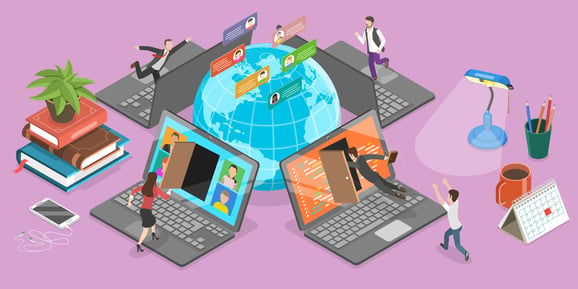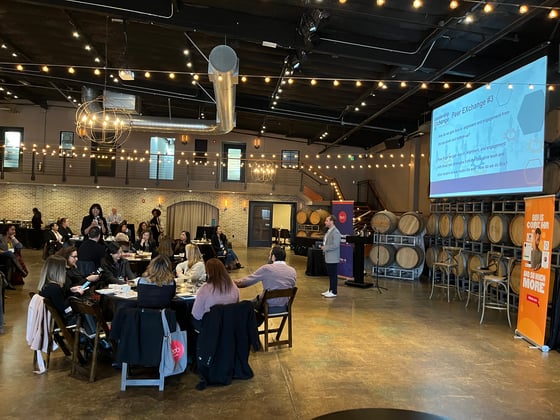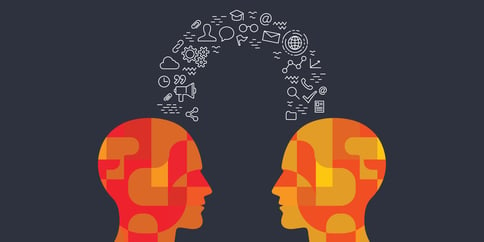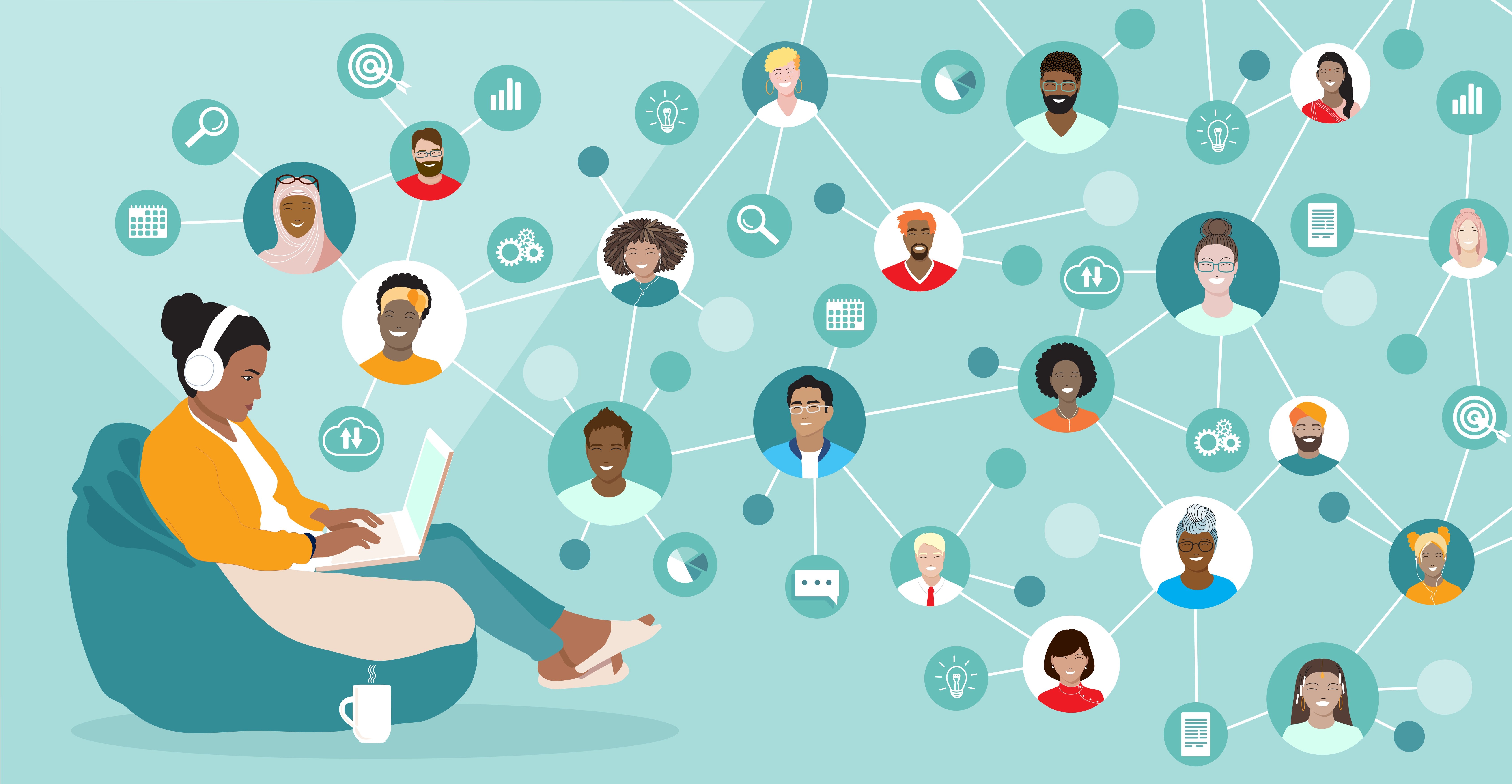“At an individual level, when life calls for change, we always feel a tensions, sometimes pleasant, sometimes unsettling. There are habits we have grown fond of; our identity is invested in certain situations. But when change isn't imposed from the outside, from above; when we personally feel powerful and responsible; when there is a safe space where we can have meaningful conversations about all of this...chances are that embracing change is somewhat easier.” ― Frederic Laloux
It’s no doubt that hybrid work represents the biggest shift in how we work in our generation.
The last two years have expedited decades of workforce transformation and filled our departments with unprecedented complexities.

With this shift, unfortunately, the connection within the workplace is at an all-time low, with 65% of workers stating they feel less connected to their colleagues and about 70% of workers feeling unsatisfied with the connection opportunities provided in their workplace.
To reinforce this insight, another study found that employees who report increased feelings of loneliness think about leaving their jobs twice as much as nonlonely workers. Additionally, employees are soul-searching and question if they belong, if they feel valued, or whether they are merely working to benefit others. Employees who do not feel valued or that they have a purpose in their work are leaving employers in record numbers.
As we enter 2023, we must create workplaces that enable employees to connect in meaningful ways.
This brings us to this new way to facilitate connection and skill development to the table – “Internal Peer-To-Peer Learning Communities.”
Another way to think about this is we are implementing a new connection and performance framework.
Building connections can be challenging to understand without a framework.
This connection framework is designed to help your organization act and create intentional connections that are aligned with the direction of the company.
We also know from an employee experience excellence study, that trust in leadership has a disproportional impact on employee engagement and other business outcomes – when people trust the company and leadership, they provide better customer support and accomplish better financial results. Everybody wins!
This experience organically builds trust with leadership in the process.
As we launch these peer-to-peer learning communities and other culture design initiatives, here are some of the common questions we have received:
What role does culture have in achieving an organization's strategic plan and goals?
Well, think of culture as a reflection of how you do things. I sometimes like to refer to it as the organization's core operating system - The true reflection of how your people work themselves and work with each other. That means, if you are establishing new goals or a new strategic direction, or even worse, you are not hitting your goals... You must ask yourself, does the way we do things make us capable of achieving these items? If not, then we must change the way we do things. Which means, we need to shift our culture. If we don’t do that, we will have a major misalignment between how we operate and where we want to go.
What role does EQ have within our teams and company culture?
Unfortunately, EQ is seen as this soft, touchy, feeling… oversharing, sense of vulnerability…
But EQ is the SECRET to better decision-making and better influence… it is the secret to overall mental health, mental strength, mental toughness, and mental resilience… You want to be awesome in life and feel awesome, you want to care for others, and set the tone, and energy of your culture, and of those around you that you lead and serve - You need emotional intelligence.
And EQ is not just about “how I feel…” It’s about tapping into a deeper understanding of what's happening in your biological system. What is happening neurobiologically, and what is happening in the social environment. So, you can have greater mastery of it. Not just to be aware of your feelings (which is critical), but also to know the difference between emotions and feelings. To also know the difference between when someone is sad versus when someone is discouraged.
And knowing what to do with all of that.
Emotional Intelligence is the gateway to a more fulfilled and impactful life. To be more engaged, more aware, and be in greater power when it comes to your emotions. Which is more important than ever right now!
How can organizations enable our people leaders to be better leaders?
Well, an obvious answer is emotional intelligence – enabling your people leaders to not only understand their own emotions but the emotions around them and what to do with all of that – so a big piece of this is awareness building and skill building and creating the space to work through this collectively.
How can we give the confidence to our leaders to have these conversations and lead these initiatives?
A large focus for us has been building out enablement resources that they can lean on for support. Workbooks & guides for these conversations. Tools to take some of the work off their plate. This ideally shouldn’t be something EXTRA they do but integrated into the things they are already doing. Make it easy to execute.
The other piece to give leaders confidence is to provide them with practice fields. This is where the peer-to-peer learning communities become really powerful. We need to provide safe spaces for leaders to practice these new strategies before they go out in the field. Every top team practices on the 'plays' they want to execute. So make sure you're providing these opportunities!

What are special about these “Peer to peer learning communities” and how do you facilitate them?
This people-first approach treats people not as a cost factor to be controlled but as the most appreciating asset: the more you invest, the more the company gains.
In hybrid work, this means providing ways to support this new way of working, supporting skill-building for navigating the new reality, and doubling down on building culture in the new environment.
The learning experiences cover all sorts of items that can support people and the organization - such as tactical advice and tools for using technology more effectively, running better meetings, managing workloads, staying connected while remote, and etiquette tips for working around interruptions.
And more importantly, these experiences provide development around soft skills & interpersonal elements like giving and receiving feedback, practicing deep listening, working through limiting beliefs, curiosity, creativity, empathy, and building trust.
But a key impact and outcome from all of this – Creating Workforce Agility – This strategy helps you foster a culture where people are paid to think, paid to support each other, paid to share information with each other, and contribute to the direction of the company collectively.

How?
- You bring people together
- You are transparent about the situation, the details, and why we are working on these items.
- We engage your people by starting to ask questions.
- We incorporate skill development into the experience and create "practice fields."
- We include asking - What should we start to stop doing?
How are they run?
These are created with a blended approach in training, facilitation, and coaching.
- Training - Has a defined outcome.
- Facilitation – The goal is more of a holding space.
- Coaching – Live practice, feedback, and working through topics together and situations.
Using a blended approach is important because it facilitates ENERGY into the topics we are training. And where energy goes, attention goes.
We believe that working in your organization should count as one of the most extraordinary experiences of your life. This is a great step towards making this a reality!
Want to learn more about this program and/or wondering how you might upskill yourself and your team through our programs?
Set up a call with us today to talk more!





